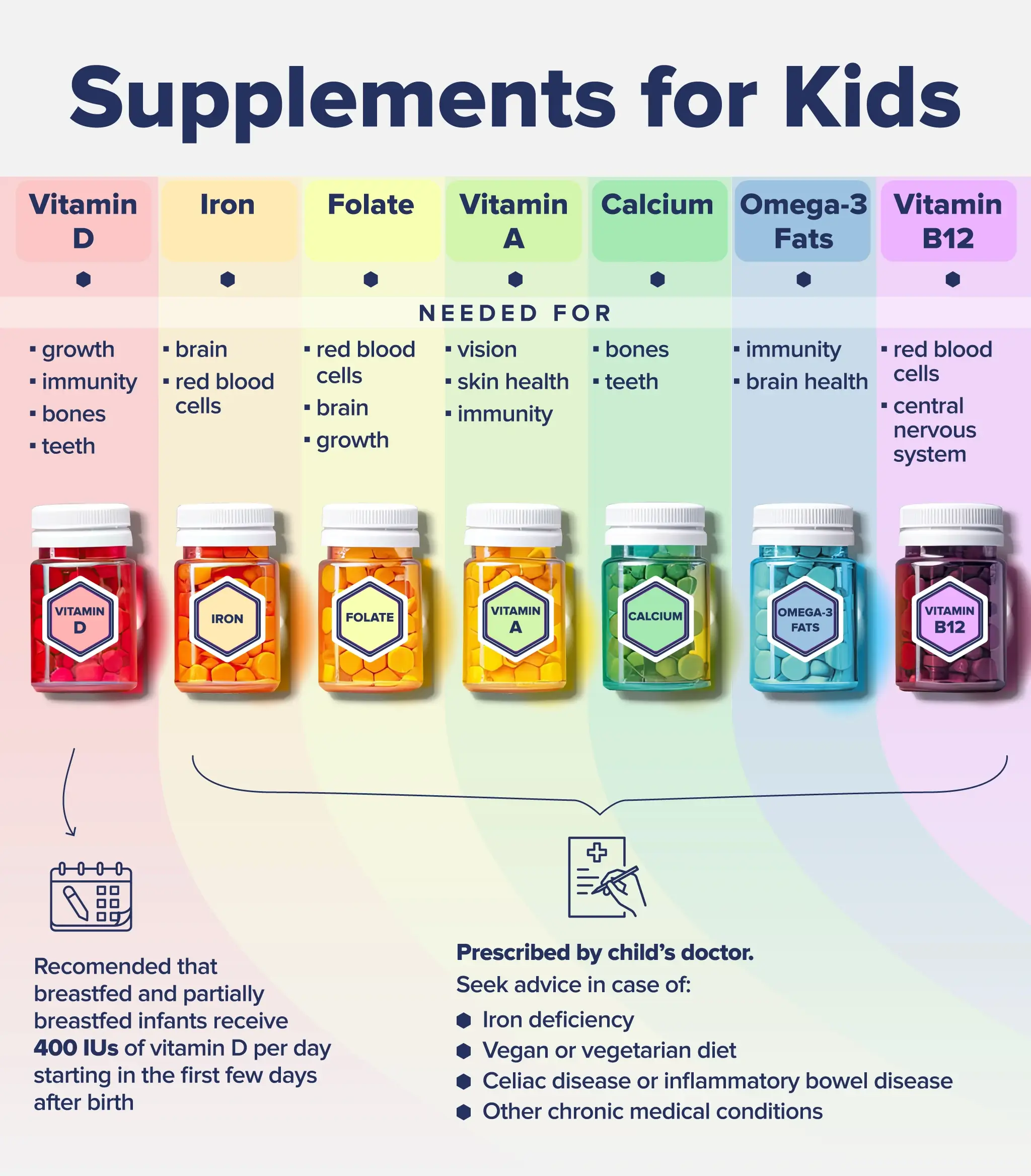Talk to a Registered Dietitian and use INSIDER20 for 20% off!
Talk to a real Dietitian for only $99: Schedule Now
This post contains links through which we may earn a small commission should you make a purchase from a brand. This in no way affects our ability to objectively critique the products and brands we review.
Evidence Based Research To fulfill our commitment to bringing our audience accurate and insightful content, our expert writers and medical reviewers rely on carefully curated research.
Read Our Editorial Policy
It’s well-known that vitamins and minerals are important for health—but some are especially crucial for growing children.
A balanced diet for kids includes fruits, vegetables, whole grains, beans and legumes, dairy, lean protein, and healthy fats, all of which contain vital micronutrients for a growing child’s health.
However, many kids are more likely to chow down on Goldfish and graham crackers than spinach and salmon, making a well-rounded diet difficult to achieve every day.

If you’ve been debating whether or not to give your child multivitamins or supplements, keep reading to learn more about whether kids need supplements, which nutrients to look out for, and which multivitamins we recommend if you choose to go that route.
There is no one-size-fits-all answer to this question, as some children might need supplements while others do not.
Experts at the American Academy of Pediatrics state that “healthy children receiving a normal, well-balanced diet do not need vitamin supplementation over and above the recommended dietary allowances (RDA).”1
However, eating a “normal, well-balanced diet” is unfortunately not the case for the majority of kids today.
While it’s undoubtedly best for your child to get their nutrients from a varied and nutritionally balanced diet, it’s not always possible to do so.
With a combination of picky eaters, less-nutritious fruits and vegetables being grown in our mineral-depleted soil, and an abundance of ultra-processed foods being marketed to youngins, most kids simply aren’t eating a perfectly balanced diet. (For that matter, neither are most adults.)
Therefore, a children’s multivitamin and mineral supplement is not a bad idea to cover your bases—as long as it’s only used in the recommended quantities.
However, you should always talk to your child’s healthcare provider before offering supplements.
Some of our favorite multivitamin and mineral supplements for children include:
Keep in mind that gummy vitamins have gotten tastier and tastier and can be easy for children to overeat if left unattended. As your child may think they are simply candy, be sure to keep all supplements in out-of-reach areas and keep the child protective cap on.
It’s always important to talk about vitamins or supplements with your child’s pediatrician or healthcare provider before giving them to your child.
Some children are already replete with nutrients. This means that adding in supplemental doses could make them veer into toxic territory, as some vitamins and minerals (like vitamins A, D, E, K, and iron) can build up in the body or are dangerous in high doses.
In general, giving your child a multivitamin supplement formulated for children (like the ones mentioned above) in the recommended doses is likely safe.
In addition to multivitamins, another common area of inadequacy or deficiency is with omega-3 fatty acids. As fish oil pills will almost certainly be rejected by a child, try a flavored liquid omega-3 supplement, like Nordic Naturals Strawberry Children’s DHA.
Plus, if your child is deficient in a particular nutrient (like vitamin D, for example), an additional child-specific vitamin D supplement could be warranted. A good option is MaryRuth’s Vegan Liquid Vitamin D3 Spray. However, you would want to monitor your child’s blood vitamin D levels to ensure they don’t get too high.
Lastly, if your child is 13 or older, check out this article all about The 8 Best Multivitamins for Teens.
Other scenarios where you might need to supplement your children include:
Some vitamins and minerals are less consumed in most children, while others tend to be eaten more regularly.
Nutrients of concern in children include:
It depends. The American Academy of Pediatrics recommends that breastfed and partially breastfed infants receive 400 IUs of vitamin D per day starting in the first few days after birth. Other than that, when to supplement is up to you and your child’s doctor. There are supplements for different age groups, including multivitamins for toddlers versus school-age children, so be sure to get the right one.2
Some nutrients that are commonly under-consumed in children include iron, calcium, vitamin D, vitamin A, folate, vitamin B12, and omega-3 fats. However, all vitamins and minerals are essential to consume in a well-rounded diet.
Some gummy vitamins are good for kids, while others are loaded with sugar, artificial colors, or preservatives. We recommend MaryRuth’s Kid’s Organic Multivitamin Gummies, SmartyPants Kids Multi + Probiotics Formula, and Garden of Life myKind Organics Kids Multi Gummies.